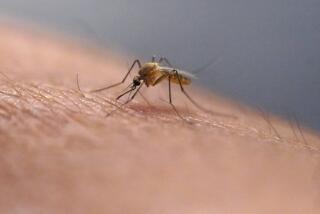State Becomes West Nile Capital of U.S.
- Share via
The spread of West Nile virus throughout the state accelerated last week as Los Angeles County became the new epicenter for the disease and California surpassed Arizona with the most human cases in the nation this year.
More than 340 people in the state have tested positive for the virus, but health officials believe thousands of others probably have had mild cases and didn’t realize it.
West Nile virus can feel as mild as a simple itch, escalate into a fever and headaches, and, in fewer than 1% of cases, eventually cause death. The virus so far has killed 10 Californians, and health officials expect more deaths before the end of summer.
People get the disease after being bitten by an infected mosquito. About 80% of those who become infected don’t experience symptoms.
Health officials say that of those who do feel symptoms, which typically include headaches, rashes and some weakness, about one in 150 suffer from more serious problems. Those include encephalitis (inflammation of parts of the brain) or meningitis (inflammation of the membranes that surround the brain or the spinal cord).
On Friday, California moved ahead of Arizona in the number of human cases -- 343 compared with 309, respectively. Based on patterns in other states, vector control officials believe West Nile will continue to spread throughout California into the early fall before stalling.
West Nile was first detected this year in San Bernardino and Riverside counties but has been moving west and north since early summer.
Los Angeles County last week reported more total cases than San Bernardino County for the first time -- 124 compared with 119.
The virus has been detected in 53 of California’s 58 counties, health officials said.
One-third of the 300 Californians to test positive with West Nile have been hospitalized with encephalitis or meningitis -- the deadliest forms of the disease.
The virus “has to start out in your blood and then it gets to the brain, and wherever it stops on the way is what we see,” said Dr. Laurene Mascola, chief of the acute communicable disease control program for the Los Angeles County Department of Health Services.
Because meningitis affects the coverings of the brain, people who develop it can get a stiff neck, blurred vision and headaches but often recover, Mascola said.
With “any type of infection of the coverage of your brain, you can recover,” Mascola said. But “there are some subtle differences. Maybe your memory is not as perfect.... It’s not like you’re debilitated.”
By contrast, encephalitis is a much harder disease for the body to fight, Mascola said. Encephalitis causes disorientation and fever and can lead to coma.
“It might start off slowly. The mosquito bites you, the virus goes in your blood,” she said. And then “you could be unresponsive. You’re just out of it, basically.”
The elderly and the frail are most affected by West Nile, health officials said, because they have weaker immune systems. All 10 Californians who have died from West Nile either were elderly or already suffering from serious health problems.
“The younger you are, the most likely you are to have a full recovery,” Mascola said.
High blood pressure, diabetes or other illnesses also make fighting West Nile harder, Mascola said.
In the Laguna Woods retirement community of Leisure World, residents said they are aware of the heightened risks the elderly face but are trying not to panic. Many said they are trying to avoid mosquitoes by staying indoors at dusk and wearing insect repellent.
“We are not alarmed, we are not scared; we’re prepared,” said resident George Portlock, 75.
“I’m not afraid of mosquitoes. I know how to protect myself,” added Linda Wilson, 70.
Although the elderly population is most at risk, doctors are becoming concerned about another illness related to West Nile that can strike people of any age. Called acute flaccid paralysis, it can produce polio-like symptoms. It is dangerous but rare.
In acute flaccid paralysis, West Nile attacks the same part of the brain that would be damaged by the polio virus, said Dr. Carol Glaser, acting chief of the viral disease section of the state health department. At risk is the part of the nervous system that controls motor skills.
“Sensory [function] is often OK. You can feel things,” she said. “You can feel someone brushing against your leg, but you can’t move your leg.”
Glaser said several factors make acute flaccid paralysis dangerous. It is not reversible and it can strike younger, relatively healthy people, she said.
A 35-year-old who had been completely healthy could experience polio-like symptoms from West Nile without having the typical symptoms beforehand, Glaser said.
“What’s particularly concerning about that syndrome is that we don’t understand it,” she said. “It usually attacks people in their 30s and 40s without any recognized risk factors.
“We often say the elderly and the immuno-compromised are at risk, but everybody is at risk [from the syndrome]. It seems to attack a fairly young individual.”
Health officials began studies on acute flaccid paralysis in 2000, a year after West Nile first arrived in New York. There is little hard data on the condition because relatively few cases have been documented.
Because there is no cure for West Nile virus or its symptoms, health officials urge people of all ages to take precautions. People should wear insect repellent containing DEET and cover up with long sleeves and pants when outside, particularly during dusk and dawn, when mosquitoes are most active.
Officials have asked people to clear their property of stagnant water, whether in birdbaths, flowerpots or swimming pools, since mosquitoes can breed in any amount of water.
More to Read
Sign up for Essential California
The most important California stories and recommendations in your inbox every morning.
You may occasionally receive promotional content from the Los Angeles Times.










